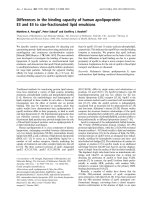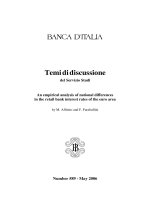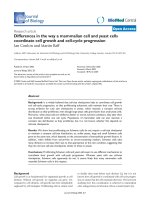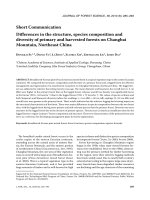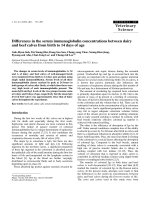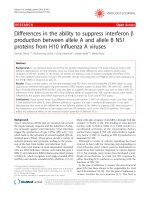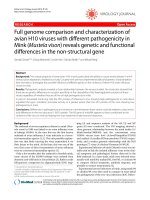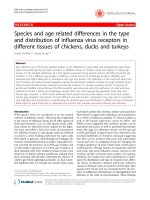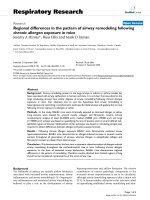SIMILARITIES AND DIFFERENCES IN THE DEFINITIONS AND USAGE OF THE WORDS ‘CHANCE’, ‘OPPORTUNITY’ AND ‘POSSIBILITY’
Bạn đang xem bản rút gọn của tài liệu. Xem và tải ngay bản đầy đủ của tài liệu tại đây (78.31 KB, 12 trang )
Le Huong Thao- K18C
VIETNAM NATIONAL UNIVERSITY, HANOI
UNIVERSITY OF LANGUAGES AND
INTERNATIONAL STUDIES
POST- GRADUATE DEPARTMENT
SIMILARITIES AND DIFFERENCES IN THE
DEFINITIONS AND USAGE OF THE WORDS
‘CHANCE’, ‘OPPORTUNITY’ AND ‘POSSIBILITY’
SEMANTICS COURSE
(Final assignment)
Student:
Le Huong Thao
Group:
K18C
Supervisor:
Dr. Ha Cam Tam
Date of submission: 28/6/2010
Hanoi, 2010
0
Le Huong Thao- K18C
CHAPTER 1: INTRODUCTION
1.1. Rationale
It is widely accepted that learning synonyms is among the most effective
ways to enrich one’s vocabulary of a second or foreign language. However, one
big problem with this strategy is that many synonyms are too confusing for
language learners, i.e they cannot tell one word from its synonym in terms of
usage. The group of chance, opportunity and possibility is such a case. Even native
speakers sometimes find it hard to explain the differences in the uses of these three
words, let alone non-native ones.
As a non-native teacher of English, the researcher herself has difficulty
distinguishing the meanings of these synonyms. She guesses several other teachers
would have the same problem, though they may not realize it. Then it could be
inferred that this problem can be more puzzling for foreign language learners,
especially those of lower levels of proficiency.
For the reasons above, the researcher determines to conduct a semantic
study on the similarities and differences in the meanings of chance, opportunity
and possibility, with a view to facilitating the understanding and using of these
synonyms.
1.2. Aims of the study
The study focuses on the examination of the three words chance,
opportunity and possibility to find out the similarities and differences in their
meanings, and whether they are interchangeable. After that, some implications for
teaching and learning English are provided.
1.3. Method of the study
This study examines the use of chance, opportunity and possibility in two
dictionaries: Oxford Advanced Learner’s Dictionary (OALD) and Cambridge
Advanced Learner’s Dictionary (CALD). The results obtained are used to
determine
whether
these
words
have
different
interchangeable, and to what extent they are synonymous.
1
connotations
and
are
Le Huong Thao- K18C
CHAPTER 2: DEVELOPMENT
2.1. Synonymy and synonyms
Synonymy in semantics is an inter-lexical sense relation. Synonymy is
sameness of meaning (Palmer F. R. 1996:88, Lyons John 1996:60, cited in
Yemisi, 2006).
Fromkin et al. (2003, pp.181) state that: “there are words that sound
different but have the same or nearly the same meaning. Such words are called
synonyms”. It is also added in this section that “no two words ever have exactly
the same meaning” even if they are synonyms. This may help explain why in a
certain context one word is preferred to another, although they are synonyms.
2.2. An article on chance, opportunity and possibility
Actually literature on this topic offers little to review. The only article the
researcher was able to find is a lesson from an online course called Virtual
Language Course (VLC). It is entitled “Three commonly confused nouns:
opportunity,
possibility,
chance”
and
VLC
provides
explanations
and
recommendations for how to use these three words.
These nouns can be used similarly, but do not mean quite the same thing. The
complementation patterns are also usually different.
eg I have the opportunity to go / of going to Beijing next month. (= I can go if I want to
do so - opportunity is a choice)
The noun opportunity is often used in these structures:
opportunity + to+ infinitive
opportunity + of+ -ing
opportunity + for+ noun
The noun possibility is usually used in these structures:
2
Le Huong Thao- K18C
possibility + of+ -ing
possibility + that+ clause
eg There's a possibility (that) I will go / of my going to Beijing next month. (= I may go
- there is no choice involved)
Right : This is a good opportunity to learn more.
Right : This is a good opportunity for making some money.
Right : There is little possibility of house prices rising next year.
Wrong: There is little opportunity of house prices rising next year.
The noun chance can be used to have the meaning of either possibility or opportunity,
and can also be used in the complementation structures shown above.
Right: This is a good chance to make some money.
Right: There is little chance of house prices rising next year.
According to the above quoted lesson from VLC, the opportunity to go/of
going contains a choice and the possibility that I will go/ of my going does not.
This means that VLC adds a sense of option to the word opportunity whereas
possibility is given a more neutral sense. It can be inferred from the examples
above that sentences like This is a good possibility to learn more and This is a
good possibility for making some money are incorrect ones. VLC proposes that
opportunity and possibility have similar use and are not interchangeable and do not
have the same connotations. As can be seen from this lesson, chance can replace
either one of the other nouns, but opportunity cannot be replaced by possibility and
vice versa.
2.3. Definitions and usage of chance, opportunity and possibility as provided by
dictionaries
2.3.1. Definitions and usage of chance
3
Le Huong Thao- K18C
CALD explains the meanings of the word chance with synonyms to it in
four different contexts: 1. “luck; the force that causes things to happen without any
known cause or reason for doing so”. In this context, chance is an uncountable
noun. 2. “likelihood; the level of possibility that something will happen. Here
chance is a singular noun. 3. “opportunity; an occasion which allows something to
be done; an opportunity” 4. “risk; a possibility that something negative will happen”.
Chance is a countable noun in 3 and 4.
OALD gives four different meanings of the word chance: The first is; “a
possibility of something happening, especially sth that you want”. The second is; “a
suitable time or occasion when you have the opportunity to do sth”. The third is; “an
unpleasant or dangerous possibility”. And the fourth is: “the way that some things
happen without any cause that you can see or understand”
CALD also gives several examples of typical collocations: of chance,
by chance, pure/sheer chance, leave nothing to chance, a better chance, chance of,
a good chance that, slim/slight chance, any chance of + ing, not a chance, no
chance, stand a chance, have a chance of + ing, chances of, chances are, get/have a
chance, give me a chance to + inf., give sb a second chance, I missed my chance and
given half a chance.
In sum, the dictionaries define chance with synonyms such as: possibility,
occasion, luck, risk and opportunity. The usage of chance covers a large variety of
meanings and variants since chance can be a countable, an uncountable or a singular
noun. Chance is found in numerous expressions and collocations in the dictionaries.
2.3.2. Definitions and usage of opportunity
CALD divides the usage of opportunity into two. The first meaning is “an
occasion or situation which makes it possible to do something that you want to do or
have to do”. The second meaning is; “the chance to get a job”. Opportunity can be
either a countable noun or an uncountable noun, with the second meaning it is always
4
Le Huong Thao- K18C
a countable.
OALD defines opportunity as “a time when a particular situation makes it
possible to do or achieve sth; a chance”.
The entry in CALD also shows some collocations: have an opportunity to,
given the opportunity of, opportunity to + infinitive, a unique opportunity to, she
missed the opportunity to, and, I don’t get much opportunity.
OALD lists the following collocations: equal opportunities, career/
employment/ job opportunities, at the earliest opportunity, a window of opportunity,
I’d like to take this opportunity, and at every opportunity.
Thus, opportunity is defined as ‘the chance to get a job, employment or
promotion’, ‘a good chance to do something that is possible’ and ‘a period of time
when the circumstances are right for doing something’. The usage of opportunity
differs depending on the fact that it can be both a countable and an
uncountable noun. Opportunity is used in several fixed expressions and has
certain preferences when it comes to adjacent words.
2.3.3. Definitions and usage of possibility
CALD gives two meanings of possibility. The first one is “a chance that
something may happen or be true” and the other is “something that you can choose
to do in a particular situation”. Possibility can be either a countable or an uncountable
noun.
OALD gives four definitions of possibility: 1.“the fact that sth might
exist or happen, but is not certain to”, 2.“one of the different things that you can
do in a particular situation”. 3. “something that gives you a chance to achieve sth;
opportunity”. 4. “Possibilities (plural): if sth has possibilities, it can be improved
or made successful; potential”.
5
Le Huong Thao- K18C
CALD suggests that possibility should be used as in the following
constructions: “It's not likely to happen but I wouldn't rule out the possibility.” “The
forecast said that there's a possibility of snow tonight.” “There's a distinct possibility
(that) I'll be asked to give a speech.” “Is there any possibility (that) you could pick me
up from the station?” “We could take on extra staff - that's one possibility.” “‘Have
you decided what to do?’ ‘No, I'm still considering the various possibilities.’”
CALD also gives an example of how possibility cannot be used; “Possibility
cannot be followed by an infinitive. Is there a possibility of finding a cure for
cancer? *Is there a possibility to find a cure for AIDS?”
OALD offers some more collocations, including: “beyond the bounds of
possibility”,
“distinct
possibility”
and
some
examples
of
verbs;
“consider/explore/investigate a wide range of possibilities” and “to exhaust all the
possibilities”
To sum up, possibility is defined in the dictionaries as ‘a thing that may
happen’, ‘a thing that is possible’ and ‘as something you can choose’. It is given
synonyms such as opportunity, chance and probability. Very few expressions exist
with possibility.
6
Le Huong Thao- K18C
CHAPTER 3: CONCLUSION AND IMPLICATIONS FOR
TEACHING AND LEARNING
3.1. Conclusion
This study makes use of two reliable dictionaries to define the
meanings and usage of opportunity, possibility and chance. Both dictionaries
list occasion, possibility and chance among the synonyms to opportunity. They
also provide several expressions and collocations containing opportunity.
The dictionaries explain possibility as “something that may happen” or a
choice, which contradicts earlier information that a possibility would not
involve a choice (as suggested in VLC lesson). Given synonyms to possibility
are, for example,: chance, opportunity and occasion. Possibility is often used in its
plural form and expressions containing possibility are rare.
Furthermore, this study has shown that synonyms to chance are, for
example, possibility, occasion, luck, risk and opportunity. It has also been
discussed that chance exists in numerous idioms, expressions, and compounds,
which resulted in the conclusion that chance is the most commonly used and the
most colloquial choice of opportunity, possibility and chance.
In conclusion, the study claims that chance covers more meanings
than either opportunity or possibility and can be said to cover a larger semantic
domain. As already mentioned, perfect synonyms hardly exist. Opportunity,
possibility and
chance
are
sometimes synonymous, whether they are
interchangeable depends on the context and the discourse since some words only
collocate with one of the terms. Even if an interchange is possible the connotation
7
Le Huong Thao- K18C
of the sentence might change. The semantic domains of opportunity, possibility
and chance partly intermingle and share a large semantic area. Among these,
chance is considered the most colloquial of the terms, the one which is used in most
idioms and informal expressions.
Due to the limited scope and materials, the conclusions drawn out in this study
should be held valid for the data taken from the two mentioned dictionaries only.
Thus, it is suggested that further research on the same topic be conducted with a
broader scope of data sources, including a larger number of reliable dictionaries. The
researcher also believes that more interesting results will be produced if a similar study
is carried out based on the native speakers- informants’ responses on their real uses of
chance, opportunity and possibility.
3.2. Implications for teaching and learning
As stated in the first chapter, the use of synonyms in general and of
opportunity, possibility and chance in particular sometimes causes a big problem
for non-native language users, especially for language learners of limited level of
proficiency. The distinction between these words is blurred for most of the time.
Therefore, it is recommended by the researcher that language teachers encourage
their students to learn the meanings and usage of these three words from reliable
dictionaries, authentic texts and speeches. It should be best to memorize the fixed
phrases and even some examples listed under these entries in dictionaries, and try
to use them in speaking and writing when possible. The researcher believes this
suggestion is most useful for learners of elementary and pre-intermediate levels.
Those of higher levels, however, may study the similarities and differences in the
meanings of these words and accordingly make up their own sentences and
utterances.
The thin boundary between the definitions and usage of these three words
also holds some implications for designing and marking English language tests. In
8
Le Huong Thao- K18C
objective tests, the answer keys of the tests should anticipate places where the use
of any of these words would be considered correct. In writing and speaking tests,
the researcher proposes that apart from fixed phrases and expressions, any misuse
of these words in certain contexts should be treated with tolerance.
9
Le Huong Thao- K18C
REFERENCES
Cambridge Advanced Learner’s Dictionary (2004). Cambridge: Cambridge
University Press. Fromkin, B. et al. (2003) An Introduction to Language. 7th.ed.
Boston: Heinle Thomson.
Oxford Advanced Learner’s Dictionary (2005). Oxford: Oxford University Press.
Virtual Language Centre (2010) ‘Three Commonly Confused Nouns: Opportunity,
Possibility, Chance.’ Retrieved June 26, 2010 from
/>y/possibility/chance
Yemisi, F. (2006). Antonymy, synonymy and hyponymy in semantics. An
encyclopedia of the Arts, 4(8), pp. 757-762
10
Le Huong Thao- K18C
11
